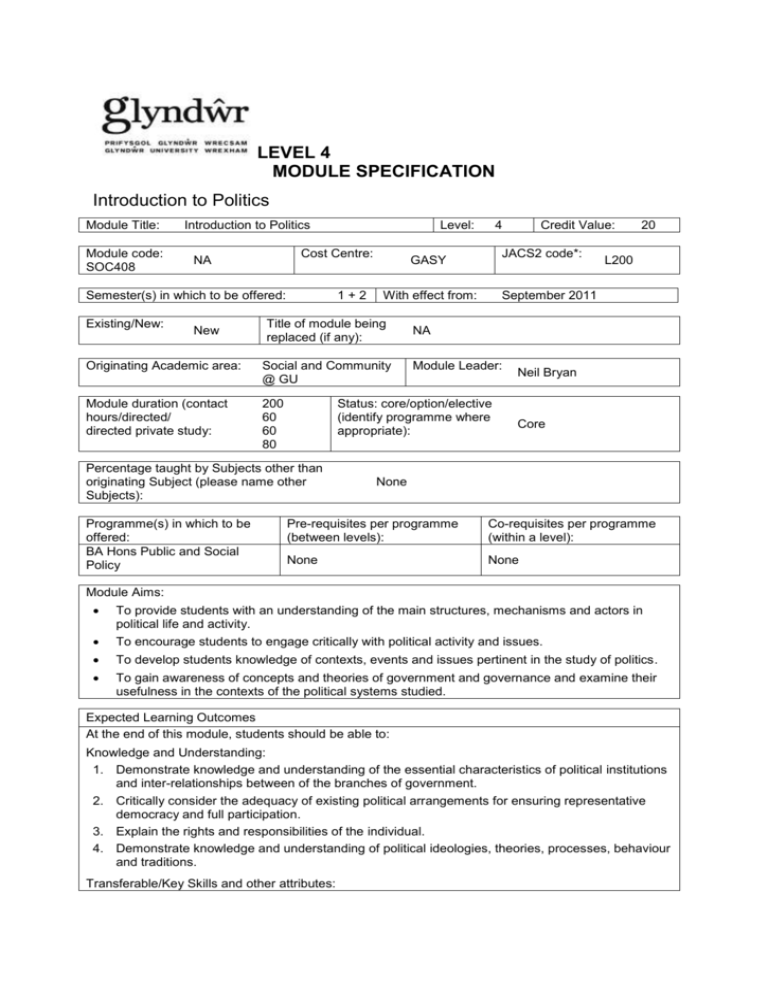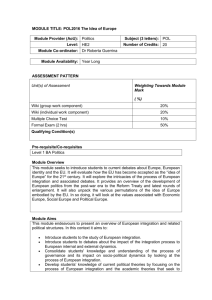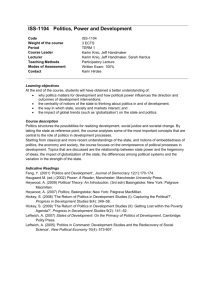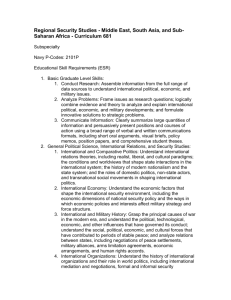
LEVEL 4
MODULE SPECIFICATION
Introduction to Politics
Module Title:
Module code:
SOC408
Introduction to Politics
Cost Centre:
NA
Semester(s) in which to be offered:
Existing/New:
New
Level:
1+2
With effect from:
Title of module being
replaced (if any):
Social and Community
@ GU
Module duration (contact
hours/directed/
directed private study:
200
60
60
80
20
L200
September 2011
NA
Module Leader:
Status: core/option/elective
(identify programme where
appropriate):
Percentage taught by Subjects other than
originating Subject (please name other
Subjects):
Credit Value:
JACS2 code*:
GASY
Originating Academic area:
Programme(s) in which to be
offered:
BA Hons Public and Social
Policy
4
Neil Bryan
Core
None
Pre-requisites per programme
(between levels):
Co-requisites per programme
(within a level):
None
None
Module Aims:
To provide students with an understanding of the main structures, mechanisms and actors in
political life and activity.
To encourage students to engage critically with political activity and issues.
To develop students knowledge of contexts, events and issues pertinent in the study of politics.
To gain awareness of concepts and theories of government and governance and examine their
usefulness in the contexts of the political systems studied.
Expected Learning Outcomes
At the end of this module, students should be able to:
Knowledge and Understanding:
1. Demonstrate knowledge and understanding of the essential characteristics of political institutions
and inter-relationships between of the branches of government.
2. Critically consider the adequacy of existing political arrangements for ensuring representative
democracy and full participation.
3. Explain the rights and responsibilities of the individual.
4. Demonstrate knowledge and understanding of political ideologies, theories, processes, behaviour
and traditions.
Transferable/Key Skills and other attributes:
Research & Study Skills
Critical thinking skills
Communication Skills
Problem solving skills
Information Technology Skills
Reflection on Learning.
Indicative Assessment Task
Assessment 1: Essay: students will choose a title from a list presented by the tutor. Topics will include
The UK Constitution and Constitutional Reform, Parliament, The Core Executive and Accountability,
Elections and voting behaviour. Students will be required to explain the functioning of the institution
and assess the adequacy of the current provision.
Assessment 2: Examination: An examination in which students answer questions, applying their
knowledge and understanding in order to address the demands of the question. Topics could include
the rights and responsibilities of citizens in the political process, the impact on Governance of recent
developments in the local, regional and international frameworks etc.
Assessment
Learning
Outcomes to
be met
Type of assessment
Weighting
1
1, 2
Essay
50%
2
2, 3, 4
Examination
50%
Duration
(if exam)
Word count or
equivalent if
appropriate
2,000
2 hours
Learning and Teaching Strategies
The module will utilise a variety of methods for teaching and learning.
These will include lectures, structured briefing papers, discussion, DVD and Video materials, individual
research and presentations by outside speakers
Syllabus Outline
This module will develop and awareness of the origin, development and current political processes in
the UK.
Students will review different ideological perspectives and relate this to current policy initiatives.
Students will also be encouraged to take a proactive approach in discussions on political issues and
begin to consider the similarities and differences at local, national and international levels.
Topics will include :
What is politics?
The UK Constitution and Constitutional Reform
Parliament
The Core Executive and Accountability
Electoral Systems, Campaigns and Elections in the UK
Voting Behaviour: theories and debates
The ideas of Politics
Political parties
Pressure Groups
Devolution
The European Union
Britain in the World
Globalisation
The Civil Service and Quangos
The politics of Law and Order
Economic Policy
Local Government
Bibliography
Essential reading:
Budge I, McKay D, Bartle J and Newton K (2007) The New British Politics 4th Edition Harlow:
Pearson Longman.
Jones B, Kavanagh D, Moran M and Norton P (2010) Politics UK 7th Edition Harlow: Pearson
Longman.
Norton (2010) The British Polity 5th Edition Harlow: Pearson Longman.
Other indicative reading:
Coxall B, Robins L and Leach R (2004) Contemporary British Politics 4th Edition. Basingstoke:
Palgrave.
Denver D (2007) Elections and Voters in Britain 2nd Edition. Basingstoke: Palgrave.
Dunleavy P, Gamble A, Heffernan R and Peele G (2003) Developments in British Politics 7
Basingstoke: Palgrave.
Duleavy P, Gamble A, Heffernan R and Peele G (2006) Developments in British Politics 8
Basingstoke: Palgrave.
GarnettM, Lynch P (2009) Exploring British politics 2nd Edition Harlow: Pearson Longman
Heywood A (2007) Politics (3rd Edition) Basingstoke: Palgrave.
Leach R (2008) The Politics Companion Basingstoke: Palgrave.
Leach R, Coxall B and Robins L (2006) British Politics 2nd Edition Basingstoke: Palgrave
Foundations.
Moran M (2005) Politics and Governance in the UK Basingstoke: Palgrave.
Norton P (2005) Parliament in British Politics Basingstoke: Palgrave.
Politics Review Deddington: periodical published by Phillip Allan.
Web Logs:
http://order-order.com/
http://blog.conservatives.com/
http://edmiliband.org/blog/
http://nickclegg.wordpress.com/
http://www.leightonandrews.com/










